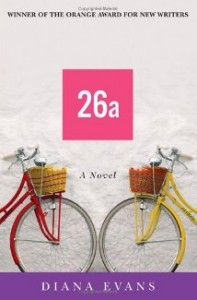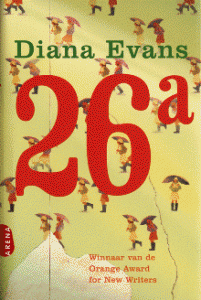Okay, it’s official. I have never, not ever, encountered a Nigerian or Nigerian-descended author who has never written about twins. If you have, drop a note in the comments. Twins are permanent residents of the Nigerian imagination. I like this fact. (In case you are not a podcast listener, Nigerians also have more twins. Than anyone else! We don’t know why, but it’s true, and it remains true even when IVF and other such things increase rates of multiple births in many Western countries.)
26a is about a family of four girls, daughters of a British father and a Nigerian mother, who live in a shabby bit of London. The oldest is Bel, Mystic Bel, who has true dreams; then come the twins, Bessi and Georgia, who do everything together; and finally the youngest, little Kemy. The book follows mainly Bessi and Georgia from the time they are seven (when their hamster dies, and they stop eating ham in tribute) into their increasingly (for Georgia) difficult and troubled adulthoods.
As a rule, I don’t enjoy these sorts of family-difficulties novels, but 26a won me over in a few different ways: first by Evans’s generosity with her characters, and then with her absolutely lovely writing. If perhaps she is overfond of metaphory poeticalness, she more than makes up for it in the way she talks about happiness and sadness, and about depression particularly.
I’m at work next to the filing cabinet and I’ve been thinking about happiness. Does it mean bouncing about and smiling a lot or is it that charge in the heart and wanting to cry? Does it stay always? . . . Because I’m beginning to think that happiness is a sensation, or a visitation, not a way of being. It goes up and down up and down it goes and sometimes there are bruises.
Y’all, that line happiness is a visitation hit me like a ton of bricks. That is a good line. Elsewhere, Georgia speaks about the kind of happiness you work at achieving — Georgia has to, anyway. Her twin sister, Bessi, does not have the same shadow in her that Georgia has, and happiness seems to come to her naturally.
She felt that nothing would ever hurt now, and that she might, after all, have the capacity for non-DIY happiness, the type of happiness that came by itself and could not be learnt from sources like [self-help books].
Or there’s this that Georgia’s therapist says:
Georgia sat back in her chair and her heels lifted off the floor. She said, “But how will I stop it from multiplying? How can I make it die?”
Katya told her it might never die, but with acceptance and good management it could be eased. “It is an endurance,” she said (endurance was a word Katya used a lot). “You overcome and chase it away, and you must be determined. You smash it to the floor. And if it is necessary you scream and tell it, I do not consent.“
Diana Evans writes about depression, basically, in much the way that depression feels (or has felt) to me. For instance, Georgia comes up with drills that she can run for when the days become bad, which again, damn, that sort of thinking has been so useful to me. (I called it protocols, but the notion was the same.)
Spoilers to follow in this paragraph: If I had known going in what was going to happen at the end, I wouldn’t have read this book. Fond as I am of my own sisters, I do not deal well with stories in which people lose their own sisters. I have been known to abandon books at rest stops in Georgia when it became clear that one of the sisters in the book was going to die. 26a is particularly sad because it’s someone losing her twin sister; and because Diana Evans herself lost a twin sister to suicide.
26a is a sad, specific book. If you are not into this type of book (which I am not), its goodness depends on the specifics’ resonating with you. I can imagine it feeling sort of mystical airy-fairy if not. But for me, this was an excellent read by a first-time author, and I’m excited to read more by Diana Evans.
Do you have any authors whose books are not exactly your thing genre-wise, but their writing makes you love them anyway?


Cover report: Again, I’m unhappy with this on both sides. The American cover is more pleasing to look upon, yet it is generic. The British cover would not cause me to pick it up in a bookstore, but I like how the cover picks up the image of the wallpaper in Bessi and Georgia’s room, and I like how it’s cracked and peeling. My instinct was American cover, and I’m keeping it there because that’s what I did with The Village. Okay. American. By a hair. And I’m not happy with either one.